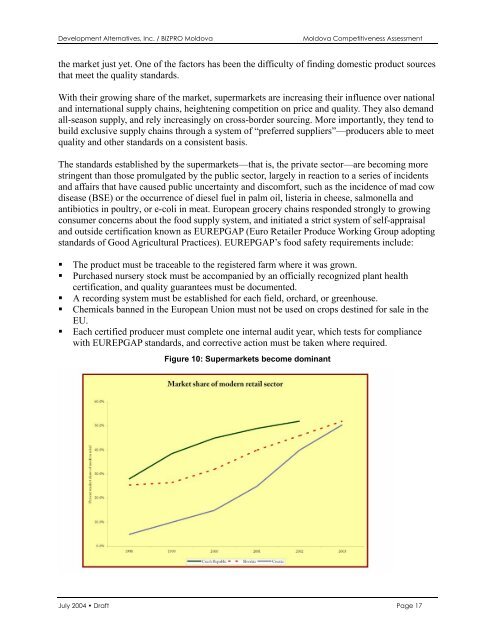Assessing Competitiveness In Moldova's Economy - Economic Growth
Assessing Competitiveness In Moldova's Economy - Economic Growth
Assessing Competitiveness In Moldova's Economy - Economic Growth
Create successful ePaper yourself
Turn your PDF publications into a flip-book with our unique Google optimized e-Paper software.
Development Alternatives, <strong>In</strong>c. / BIZPRO Moldova Moldova <strong>Competitiveness</strong> Assessment<br />
the market just yet. One of the factors has been the difficulty of finding domestic product sources<br />
that meet the quality standards.<br />
With their growing share of the market, supermarkets are increasing their influence over national<br />
and international supply chains, heightening competition on price and quality. They also demand<br />
all-season supply, and rely increasingly on cross-border sourcing. More importantly, they tend to<br />
build exclusive supply chains through a system of “preferred suppliers”—producers able to meet<br />
quality and other standards on a consistent basis.<br />
The standards established by the supermarkets—that is, the private sector—are becoming more<br />
stringent than those promulgated by the public sector, largely in reaction to a series of incidents<br />
and affairs that have caused public uncertainty and discomfort, such as the incidence of mad cow<br />
disease (BSE) or the occurrence of diesel fuel in palm oil, listeria in cheese, salmonella and<br />
antibiotics in poultry, or e-coli in meat. European grocery chains responded strongly to growing<br />
consumer concerns about the food supply system, and initiated a strict system of self-appraisal<br />
and outside certification known as EUREPGAP (Euro Retailer Produce Working Group adopting<br />
standards of Good Agricultural Practices). EUREPGAP’s food safety requirements include:<br />
The product must be traceable to the registered farm where it was grown.<br />
Purchased nursery stock must be accompanied by an officially recognized plant health<br />
certification, and quality guarantees must be documented.<br />
A recording system must be established for each field, orchard, or greenhouse.<br />
Chemicals banned in the European Union must not be used on crops destined for sale in the<br />
EU.<br />
Each certified producer must complete one internal audit year, which tests for compliance<br />
with EUREPGAP standards, and corrective action must be taken where required.<br />
Figure 10: Supermarkets become dominant<br />
July 2004 • Draft Page 17
















